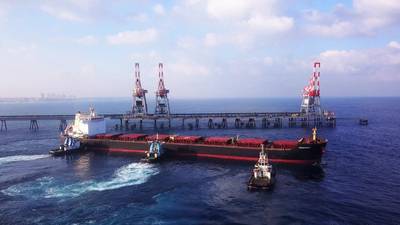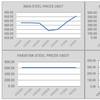Baltic Dry Index Logs Worst Month Since January 2020
The Baltic Exchange's dry bulk sea freight index eased on Friday and posted its biggest monthly fall since January 2020, hurt by a decline in rates across all vessel segments.
The overall index, which factors in rates for capesize, panamax, supramax and handysize vessels, fell 111 points, or 3.1%, to 3,519, its lowest since Aug. 12.
The index fell more than 30% this month and was down 20.2% this week.
Concerns over the health of the Chinese economy have led to a sharp decline in the dry bulk sector, which was already "exasperated due to the (China) Evergrande situation," Alibra Shipping London said
The brokerage, however, added that the outlook for the sector remained firm due to high demand for commodities.
The capesize index fell 193 points, or 4.3%, to 4,349, its lowest since Aug. 10. The index has more than halved this month.
Average daily earnings for capesizes, which transport 150,000-tonne cargoes such as iron ore and coal, fell $1,604 to $36,065.
China's steel rebar and hot-rolled coils futures rose on Friday as the environment ministry pledged to cut concentrations of hazardous, small airborne particles known as PM2.5 over the winter, while steelmaking ingredients fell more on coal drags.
The panamax index fell 69 points, or 1.7%, to 3,896, lowest in over two weeks.
Average daily earnings for panamaxes, which ferry 60,000-70,000 tonne coal or grain cargoes, decreased by $621 to $35,061.
The supramax index fell 86 points to 3,104, touching its lowest since Aug. 13.
(Reporting by Kavya Guduru; Editing by Shailesh Kuber and Ramakrishnan M.)











